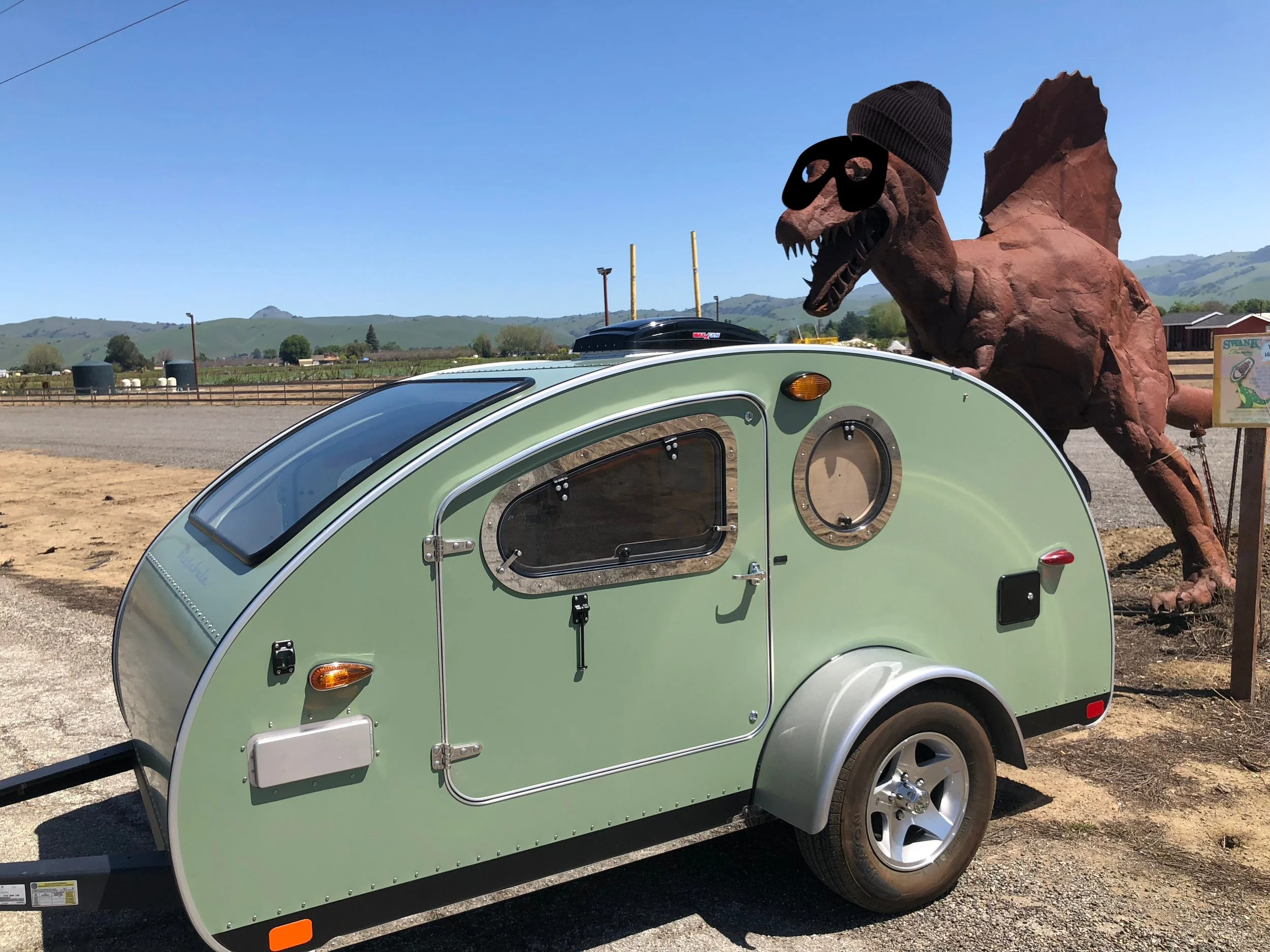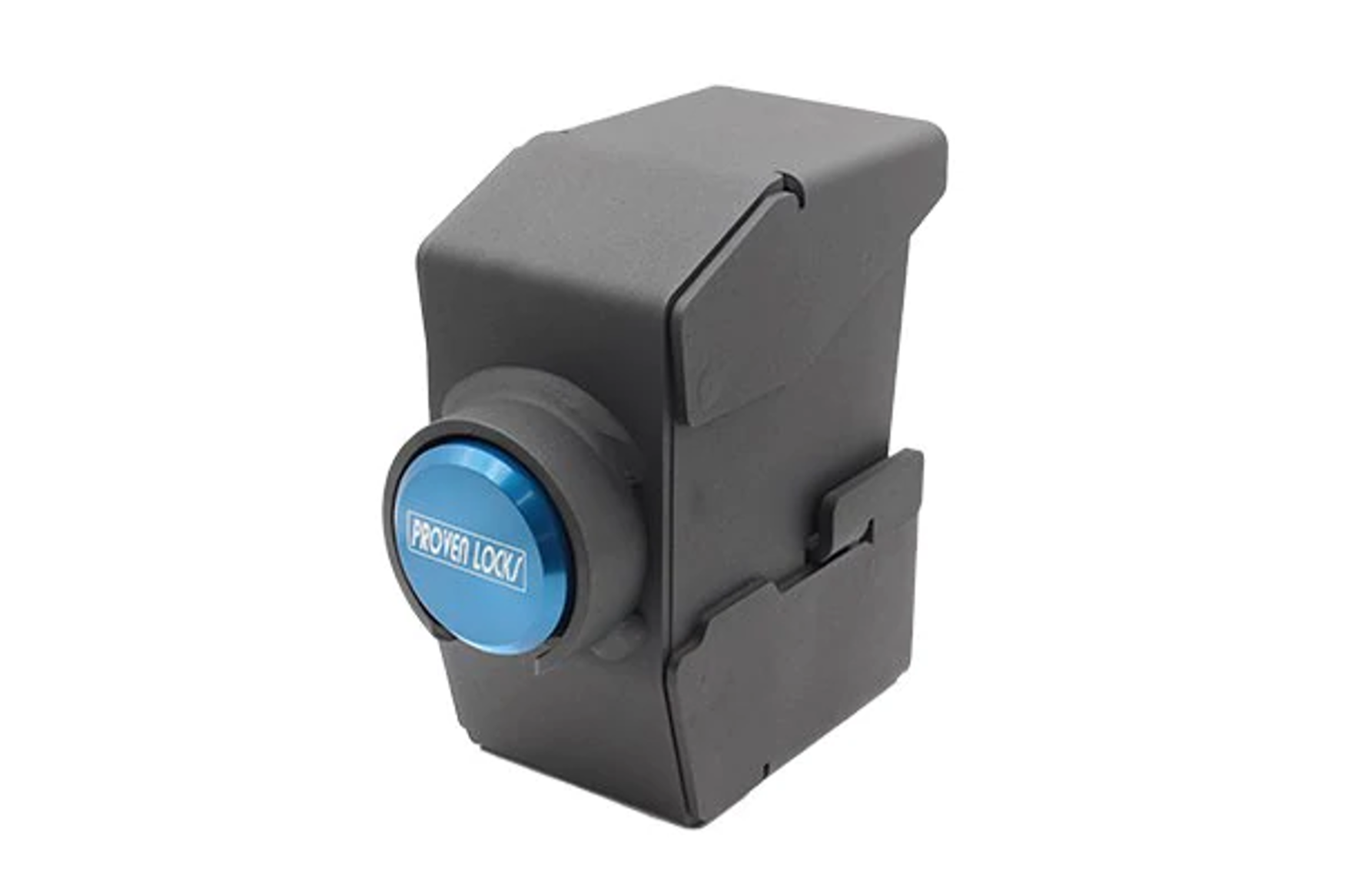Buying a Vistabule Teardrop Trailer is a significant monetary decision. Whether you’ve financed through a bank or dipped into your nest egg, you have made a big financial investment. It is an unfortunate reality that crime and theft are on the rise. According to the National Insurance Crime Bureau, “Thieves stole 880,595 vehicles in the U.S. in 2020, up 10.9% from 2019,” so, it only makes sense that you would want some assurances that your trailer is going to be protected.
Crime-o-saurus!
Insurance
Before we dive in to locks and securing your trailer, your first step should be to consider a good insurance policy that covers your trailer against theft. In a worst-case scenario, this will help cover the costs of your investment. A good insurance policy will take away a lot of that sting should you become a victim yourself. Much like locks, not all policies are equal, so be sure to shop around.
Common-sense Security: At Home
Now let's talk about security. There are some common-sense best practices that will go a long way in insuring that you and your trailer aren’t the victims of crime. Consider where you will be storing your trailer when not in use. Not everyone will have the space to store a trailer in a garage, but this is obviously the best preventative measure. If you must store your trailer outside, consider placing it somewhere with high visibility, but not so close to the street that a thief could “case” your trailer from their car to figure out a good point of attack. Think about investing in a prominently placed security camera to let thieves know they are being watched and recorded. Install motion detecting lights—make the thieves do their dirty work exposed out in the open.
Common-sense Security: In The Wild
And what about when you are using your trailer while camping, but have plans that will leave it unattended for the day? Thefts are statistically less likely while camping in a crowded campground. Too many eyes and ears. You should feel relatively safe leaving your trailer behind while you go out hiking, fishing, etc. If you are boondocking, you may feel more hesitant to leave your trailer behind, but it is also less likely that criminals are prowling the backcountry looking for an easy score. Of course, any time you leave your trailer alone, lock it up the same way you would while storing it at home. And that brings us to locks.
Your locked trailer is relatively safe in a crowded campground
Locking Up Your Trailer
There is a wide variety of locks out there to secure your trailer. There are coupler locks that cover up the entire hitch point, which makes it impossible to secure the trailer to a ball hitch to tow away while the lock is engaged. These are by far the most common locks for securing your trailer and tend to offer the most robust level of protection. There are lockable pins that thread through the coupler clasp that prevent it from being able to lock onto a hitch ball, making a secure connection for towing very difficult. There are wheel chock locks, much like a boot found on an illegally parked vehicle, that will prevent your trailer’s wheels from rolling. And there are simple padlocks that can secure your trailer’s safety chains (although towing away a stolen trailer with safety chains alone is incredibly dangerous/stupid as the trailer will be all over the road and will crash through the rear of the tow vehicle as soon as it slows down.) Many people like to mix and match these different lock options for added security.
“What Lock(s) Should I Buy?”
I like to offer a little disclaimer before suggesting a specific brand of lock. Though some locks are far better than others, all locks can be cracked. It comes down to how skilled/and or determined the would-be thief happens to be. A good lock will deter crimes of opportunity; but with time, tools, and know-how, all locks can be broken/picked. I could show you almost any current lock on the market and then a subsequent YouTube video demonstrating that lock being picked/drilled/sawed/hammered into and eventually bypassed. So, it comes back that idea of deterrence. Which lock is going to be enough of a hassle that it will deter most thieves due to its construction, build quality, lock core complexity, etc.?
Lockpicking is a skill that requires finesse, experience, and specific tools. It is more likely that a thief will rely on brute strength with crowbars, sledgehammers, or power tools (drills, Sawzalls, angle grinders) to simply break the lock or its anchor point. This means you want to look for a lock with a strong metal body (e.g., steel, carbon steel---some lock companies use zinc alloys to save on costs - but these tend to be weaker against brute force attacks when compared to steel) that is constructed with brute force and power tool attacks in mind.
These are not official endorsements of any kind, but the following locks are highly rated online, and that seems to be some indication that they are successfully deterring most thefts. All of these products are currently compatible with a Vistabule. Proven Industries makes a beefy coupler lock, the 2178-D1, that would deter most opportunists. Another option is a wheel chock lock like the TCL65, by Trimax. Alternatively, if you like like the idea of having less keys, you can stick with Proven Industries and try their wheel boot. For $1 they can key both the coupler lock and wheel boot the same. While this is on, your trailer isn’t going anywhere. Because some more enterprising thieves may remove the entire wheel and throw on a spare to bypass the wheel chock lock, you may also want to consider a wheel lock that replaces one of your wheel’s lug nuts with a uniquely keyed lock that fastens to one of the five studs on your axle hub. If a thief can’t remove all the lug nuts, they can’t remove the wheel.
Proven Locks Model 2178-D1
Having all of options mentioned might be overkill for some, and for others it will give them just the peace of mind they’re looking for.
Supplemental Security (GPS Tracking)
Finally, some trailer owners round out their security by hiding a GPS tracker in an inconspicuous location on their trailer. The tracker is usually paired with an app for your phone or computer that will give you very accurate live updates on the movement and location of your trailer. The downside of many of these products is that they do require some sort of monthly or annual subscription fee. While this next option is limited to iPhone users, the Apple AirTag is a cheaper alternative to a traditional GPS tracker and doesn’t require a subscription. Roughly the size of a quarter, these small discs ping their location off other iPhones in the area, which is then relayed to your iPhone via the “Find My” application. The accuracy of the AirTag is of course dependent on being in the vicinity of other iPhones, which isn’t likely an issue in populated areas, but will be less than helpful if your trailer is being towed in a remote location. Tile is a similar technology and is compatible with Android phones.
Apple AirTag
A Final Word
In the end, it bears repeating that the best thing you can do to secure your trailer is to have it insured against theft. Buy a good lock or two, be smart, be vigilant, but most of all try not to worry too much--- your new Vistabule Teardrop Trailer should be a source of enjoyment, not stress!





